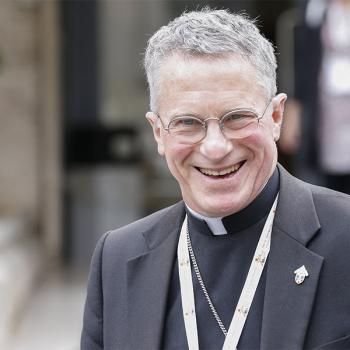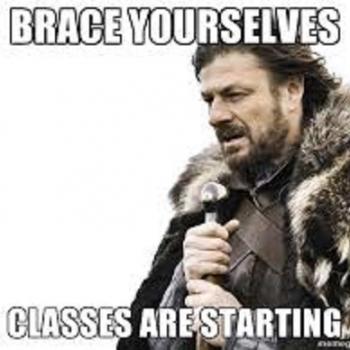
Odds are, you never took a “religious studies” class.
If you did, it was probably a confessional course on a particular faith tradition. Maybe it was a unit in your high school’s social studies curriculum. At best, you took a “world religions” survey at college.
Despite their benefits, none of these gave you the right tools to study religion.
Which is weird, when you think about it.
Because “religion is arguably the most powerful and pervasive force in the world.”
When I studied religion at the University of Florida, I learned that knowing something about religion helps us understand heaps about the world. Religious studies is about more than studying individual religions, but how religion functions as part of politics, science, economics, and society at large.
As a scholar, newswriter, and wayward pastor, I’ve come to appreciate religious studies even more. I believe a basic literacy in “religion as part of the human experience” is key to having informed perspectives on modern life.
In other words, I think you missed a lot without religion class.
“What You Missed Without Religion Class” is here to help, demystifying the study of religion and discussing religion’s role in contemporary society.
Religion Matters
Whether we believe or not, whether we think it’s good, bad, or in between — religion matters.
Defined in different ways, religion provides many people with ways of understanding themselves and interacting with others and the world they live in. Over time, it has inspired and justified “acts and attitudes from the heroic to the heinous.” Despite those who believed religious affiliation would wane in the modern era, some 83% of the world’s population still identify as “religious.”
To navigate conversations about climate change, freedom, human rights, global economies, or technology, we have to address how these dialogues have religious dimensions to them.
Either as a social force or a created concept, religion deserves our attention.
Religious Education Matters
Approaches to learning about religion vary wildly across the world.
In Germany, confessional religious education or ethics courses are mandated by the constitution. In Malaysia, Muslim students take Islamic studies classes and non-Muslims are compelled to take “Moral Studies” courses. In England, France, South Africa, Norway, and Japan there is some form of “religious” or “ethics” education.
For some, it means nurturing some form of sectarian system or promoting a particular morality. For others, it’s about teaching students about the many worldviews on offer.
The U.S. has no rigorous standard for religious education. Because of how the Establishment Clause of the First Amendment is interpreted, “the subject does not exist at all in American public schools.”
As many have lamented, this has led to rampant “religious illiteracy.”
From the wheat fields of Iowa to the buckled asphalt of Los Angeles, people claim allegiance to a wide array of religious traditions. Yet, regardless of religious affiliation — or lack thereof — we are “a nation of religious illiterates” who flunk the most basic of quizzes on religion.
In recent years, a variety of “religious literacy” initiatives, courses, and books have come to the rescue.
Each tends to cover different religious traditions, typically those deemed to be “the world’s great religions,” investigating each according to the teacher’s own definition of religion. Even my own previous efforts inclined in this direction.
The problem is: this approach isn’t working.
Most of these world’s religions survey courses leave students with a superficial knowledge of religion or pass on tired stereotypes. Students “rarely come to study religion because they wish to be neutral social scientists or simply to describe religious belief and practice more accurately.” As a result, many courses either present various traditions as offerings at some kind of spiritual smorgasbord or promote a particular religious perspective over and against others.
We can, and should, do better.
What You Missed Without Religion Class
My articles on Patheos are meant to offer an alternative to the same old way of learning about religion.
It’s meant to make up for what we missed without religion class.
To that end, its approach is decidedly cultural and critical. While I appreciate theological studies — and have two degrees in the topic to prove it — I approach religion with the tools of anthropology, history, and other social sciences.
I take a descriptive, not prescriptive, approach to the topic of religion. That means considering the ways humans have created traditions, crafted beliefs, and coined the very term “religion” itself.
With a fair does of ironic humor and a bit of snark, I explore religion as part of human culture and society, not something distinct from them.
Instead of simply describing ceremonies and symbols, holy books and divine discourses, material culture and religious communities in isolation, I ask:
- How do we study religion?
- Why do we consider certain things “religious” and others not?
- How does our definition of religion shape the world we live and the ways we engage with it?
In other words, religious education is about more than studying religions, but considering how religion is part-and-parcel to our everyday lives, whether we consider ourselves “religious” or not.
And that is exactly what, “What You Missed Without Religion Class” is all about.
Further Reading & Resources on Studying Religion and Religious Literacy:
- Read, the American Academy of Religion’s Religious Literacy Guidelines
- Read, Studying Religion: An Introduction
- Watch, “Religion for Breakfast”
- Listen, “Keeping it 101”
2/9/2022 2:08:52 PM





